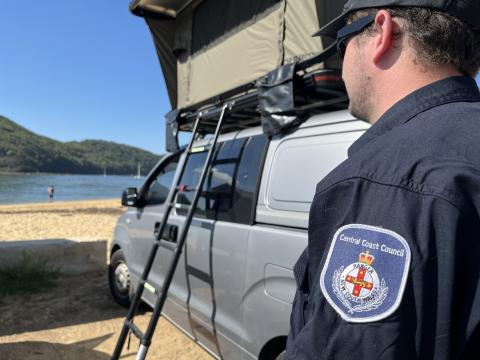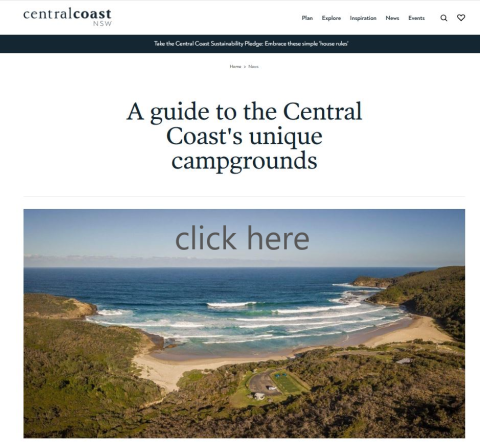Illegal camping
Blitz on illegal camping – increased patrols and fines
We love sharing our region with visitors, but it’s important that our public spaces remain clean, safe and accessible for everyone.
There are many low-cost camping options around the Coast and visitors are encouraged to book ahead as camping in streets, parks and reserves is prohibited.
In response to ongoing community complaints, we’re increasing efforts to combat illegal camping in public spaces. Ranger patrols will operate 7 days a week, from early morning to night, enforcing rules and issuing fines.
Council acknowledges that some individuals camping illegally may be experiencing homelessness, which is approached in a very different way. In such cases, rangers work with the Specialist Homelessness Services and the Central Coast Assertive Outreach Team to connect people with housing, health and crisis relief. On some occasions, we work with providers to temporarily relocate these persons to Council caravan parks while they work with them on transition plans. Homelessness is a complex issue, with the leading causes being family breakdown and a lack of affordable housing. We continue to collaborate with the police and State government agencies and local service providers to find long-term solutions.
What Council is doing to reduce illegal camping
- Increased ranger patrols – Council Rangers will be working closely with police to ensure our public spaces are safe and lawfully used. There will be a focus on popular sites or areas that our community have told us they’re concerned about.
- Stronger enforcement – On-the-spot fines for illegal camping range from $110 to $2,200, with repeat offenders facing a maximum penalty of $110,000.
- New signage – Council has recently reviewed and updated signage at known hotspots, restricting overnight parking between 10pm and 5am and prohibiting camping. Full signage upgrade will be complete by 31 March 2025.
- Public awareness campaign – A targeted campaign is underway to inform locals and visitors about legal camping options and deter illegal camping.

Where can visitors stay?
Visitors can stay in approved holiday parks, camping grounds, other visitor accommodation. To find cost-effective accommodation and spaces on the Central Coast. Explore our guide to the Central Coast's unique campgrounds.

Or check out one of these sites:
• Central Coast Holiday Park Caravan, Camping and Cabins - Central Coast Holiday Parks
• Top campsites & caravan parks on the Central Coast | Visit NSW
• Patonga Camping - Patonga Caravan And Camping Area
• The best free camping spots in NSW | Visit NSW
• Camping and accommodation | NSW National Parks
• Top 22 camping areas with powered sites near Central Coast - Anycamp
Reminder: Camping in residential streets, beach and other public carparks, national parks, nature reserves or on Crown land is against the law and fines may be issued.
Respect our natural environment
The Central Coast is home to stunning beaches, pristine bushland and unique wildlife. Illegal camping can lead to littering, damage to natural areas and harm to the local ecosystems. By booking an authorised campsite, you’re helping to:
• protect native wildlife
• keep beaches and bushland clean and safe for everyone
• reduce pollution and fire risks in natural areas.
We encourage all visitors to tread lightly and respect the local environment.
Report illegal camping
To report illegal camping in public spaces, contact Council customer service team on 02 4306 7900 or submit a report online.
-
Addressing homelessness with compassion
Council acknowledges that some individuals camping illegally may be experiencing homelessness. In such cases, rangers work with the Specialist Homelessness Services and the Central Coast Assertive Outreach Team to connect people with housing, health and crisis relief. On some occasions, Council works with providers to temporarily relocate these persons to Council caravan parks while they work with them on transition plans.
Homelessness is a complex issue, with the leading causes being family breakdown and a lack of affordable housing. Council continues to collaborate with the police and State government agencies and local service providers to find long-term solutions. Read about Hardship and Homelessness Services.
We continue to support vulnerable people in our community include those facing homelessness. Our Central Coast Affordable and Alternative Housing Strategy outlines specific actions to assist in the prevention of homelessness and address the growing need for affordable housing.
-
Homelessness has increased by 60% in the past calendar year, and it is estimated that there is over 6000 people who are homeless on the Central Coast. The most vulnerable of these are rough sleepers who are utilising cars, vans and tents as a form of shelter.
Council has a partnership with State Government Funded Specialist Homelessness Services to offer support to people who are homeless. This partnership has been established in reference to the NSW Governments Protocol for Homeless People in Public Places, which is a guide to ensure that people who are experiencing homelessness are treated respectfully, appropriately and are not discriminated against on the basis of their homeless status.
Where a person has been identified to be homeless by the Assertive Outreach Team, Specialist Homelessness Services will determine appropriate pathways and work with Council staff to find a suitable booking at a Council owned caravan park.
Council staff have on-going meetings with the NSW Police Force, Department of Communities and Justice, Homes NSW, Local Health District and Specialist Homelessness Services to determine what other options are available in resolving local homelessness concerns.
-
Only the Police have the authority to issue move on directions. Council staff do not have the power to forcibly remove people from the public space. The Police are aware of local hot spots and the challenges arising from our rough sleeper population. They have the powers to respond to any breaches of the peace or criminal activity. When a crime is committed, or there is a threat to safety, the public are advised to call Triple 000.
-
This blitz on illegal camping is in response to ongoing resident complaints. At the Ordinary Council meeting of 25 February 2025, a number of recommendations were endorsed by Council in response to the increase in unlawful camping across the Central Coast.
These included:
- A review and install signage to prohibit free parking at Council reserves and carparks by prohibiting carparking overnight between 10:00pm and 5:00am, and by prohibiting camping.
- Council's rangers to enforce the above restrictions immediately.
Read the Council report here.